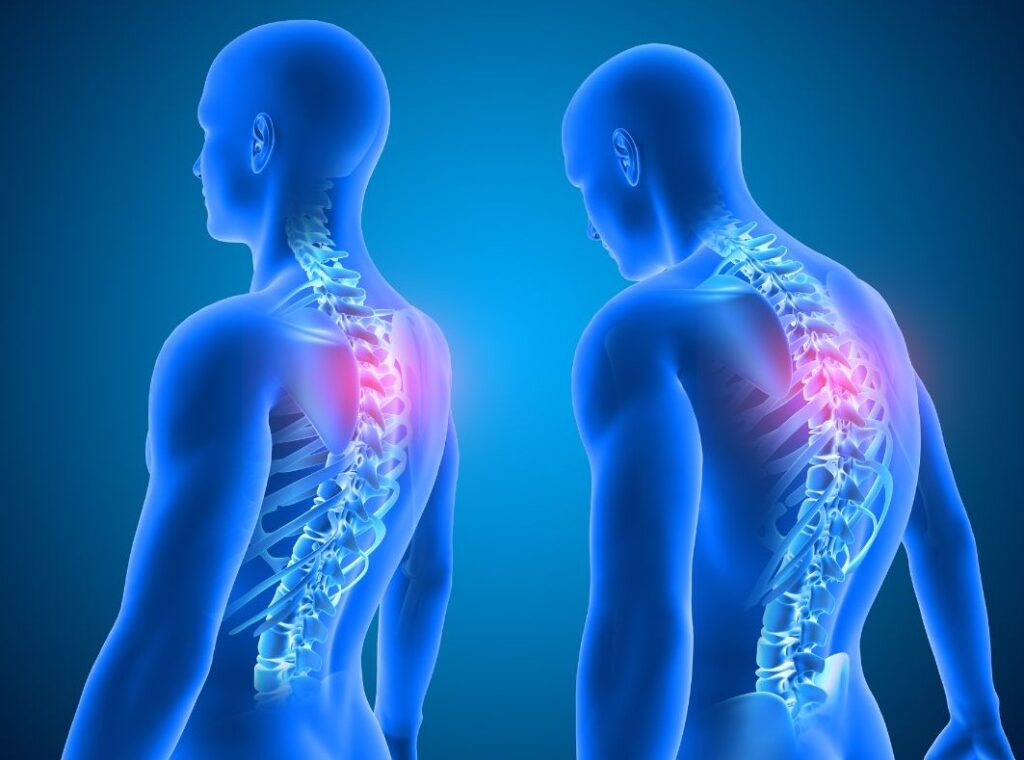
Back pain is one of the most common issues that we see here in the clinic, affecting millions of people worldwide, impacting their daily lives and overall well-being. Whether it’s a dull ache or a sharp, stabbing sensation, back pain can hinder productivity and diminish the quality of life. Fortunately, many cases of back pain are preventable by addressing common causes and adopting healthy habits. In this blog post, we will explore some of the most prevalent causes of back pain and provide practical tips on how to avoid them. Plus if you’d like some help to beat your back pain you can learn about our Back Pain Program.
Poor Posture

One of the leading causes of back pain is poor posture. In today’s digital age, where many individuals spend extended periods sitting at desks or hunched over electronic devices, maintaining proper posture is often neglected. Slouching and sitting with a rounded back for extended periods can strain the muscles and ligaments in the spine, leading to discomfort and pain. To avoid poor posture-related back pain, make a conscious effort to sit up straight, with your shoulders back and your spine aligned. Consider using ergonomic chairs and desks to support a healthy sitting posture. Additionally, take breaks to stand and stretch throughout the day to relieve tension in the back muscles. We recommend standing for 5-10 minutes out of every hour spent at your desk.
Sedentary Lifestyle
A sedentary lifestyle, characterized by prolonged periods of sitting and minimal physical activity, is closely linked to back pain. Lack of exercise weakens the muscles that support the spine, making them more susceptible to strain and injury. Incorporating regular physical activity into your routine can help strengthen the core muscles, providing better support for the spine.
Engage in activities such as walking, swimming, or yoga to promote flexibility and strength. Simple exercises like pelvic tilts, bridges, and cat-cow stretches can specifically target the muscles in the lower back, reducing the risk of pain and discomfort. Strength training is your best bet for long term reduction of back pain: seeing an exercise physiologist for a personalised strength program is extremely beneficial for this!
Improper Lifting Techniques

Improper lifting techniques are a common cause of back injuries. Whether lifting heavy objects at work or lifting groceries at home, using incorrect methods can strain the back muscles and lead to pain. To lift objects safely, bend at the knees and use your leg muscles rather than your back. Keep the object close to your body and avoid twisting while lifting. If an object is too heavy or awkward to lift on your own, don’t hesitate to ask for assistance. Taking the time to lift properly can prevent unnecessary strain on your back and reduce the risk of injury.
Obesity
Excess weight places additional stress on the spine, increasing the likelihood of back pain. Obesity is often associated with poor posture and weakened muscles, exacerbating the impact on the spine. Maintaining a healthy weight through a balanced diet and regular exercise can significantly reduce the risk of back pain. Adopting a lifestyle that includes nutritious meals and staying physically active not only supports weight management but also promotes overall spine health. Consult with a healthcare professional for personalised advice on nutrition and exercise.
Stress and Emotional Factors

Believe it or not, stress and emotional factors can contribute to back pain. When stressed, the body tends to tense up, leading to muscle stiffness and discomfort. Chronic stress can also contribute to conditions like tension headaches and muscle spasms, which may manifest as back pain. Incorporating stress management techniques such as meditation, deep breathing exercises, or yoga can be beneficial for both mental and physical well-being. Taking time to relax and unwind can help prevent the build-up of tension in the back muscles, reducing the risk of pain.
Back pain is a common issue that can significantly impact daily life, but it’s often preventable through lifestyle changes and awareness. By addressing common causes such as poor posture, a sedentary lifestyle, improper lifting techniques, obesity, and stress, individuals can take proactive steps to protect their spine health. Implementing these preventive measures can lead to a healthier, more comfortable life, free from the limitations imposed by back pain. Remember, it’s never too late to start adopting healthy habits that promote a strong and resilient back.
Need some help with managing back pain? Click below to ask us a question or book an appointment.

